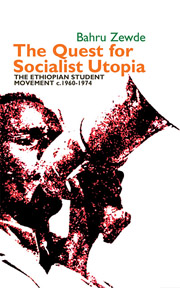Book contents
- Frontmatter
- Dedication
- Contents
- List of Illustrations
- Acronyms
- Abbreviations
- Glossary
- Note on Transliteration
- Note on the Ethiopian Calendar
- Acknowledgements
- Introduction
- 1 Youth in Revolt
- 2 The Political and Cultural Context
- 3 In the Beginning: ‘That Will Be the Day, When …’
- 4 The Process of Radicalization
- 5 1969: Prelude to Revolution
- 6 Championing the Cause of the Marginalized: The National Question and the Woman Question
- 7 Fusion and Fission: From Student Unions to Leftist Political Organizations
- 8 Conclusion: The Legacy
- Bibliography
- Index
8 - Conclusion: The Legacy
Published online by Cambridge University Press: 05 April 2014
- Frontmatter
- Dedication
- Contents
- List of Illustrations
- Acronyms
- Abbreviations
- Glossary
- Note on Transliteration
- Note on the Ethiopian Calendar
- Acknowledgements
- Introduction
- 1 Youth in Revolt
- 2 The Political and Cultural Context
- 3 In the Beginning: ‘That Will Be the Day, When …’
- 4 The Process of Radicalization
- 5 1969: Prelude to Revolution
- 6 Championing the Cause of the Marginalized: The National Question and the Woman Question
- 7 Fusion and Fission: From Student Unions to Leftist Political Organizations
- 8 Conclusion: The Legacy
- Bibliography
- Index
Summary
was born in a volcano, I lived in the midst of its eruption, I will be buried in its lava.
For about a decade and a half in the middle of the past century, Ethiopian students made a decisive and fateful intervention in the national affairs of their country. In a system that did not brook any formal political dissent, they effectively became His Majesty's Disloyal Opposition. They began rather tentatively, reciting poems of social and political satire that were barely tolerated by the imperial regime. They ended with hijackings of passenger aircraft and armed struggle. In between, they punctuated their struggle with annual, almost ritual, demonstrations and, in some extreme circumstances, embassy occupations. The cumulative effect of this unrelenting opposition was the eruption of the 1974 revolution, even if that event could not be attributed entirely to the student movement. The more than decade-long armed struggle in Eritrea, the disastrous 1973 famine in northern Ethiopia, and the energy crisis that attended the Arab-Israeli (Yom Kippur) War were other contributory factors. Neither did the impact of the student movement end with the eruption of the revolution. It continued to determine the contours and trajectory of post-revolutionary developments. The two leftist parties that batted it out for hegemony emerged directly out of the movement. While they were consumed by the revolutionary conflagration, the ethno-nationalist groups that arose in the periphery of the movement but were nurtured by its ideology, notably the Tigray People's Liberation Front (TPLF) and Oromo Liberation Front (OLF), endured to determine the post-1991 political configuration of the country.
- Type
- Chapter
- Information
- The Quest for Socialist UtopiaThe Ethiopian Student Movement, c. 1960-1974, pp. 263 - 280Publisher: Boydell & BrewerPrint publication year: 2014



